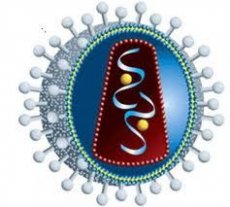Medical expert of the article
New publications
Why is the human body unable to fight HIV?
Last reviewed: 01.07.2025

All iLive content is medically reviewed or fact checked to ensure as much factual accuracy as possible.
We have strict sourcing guidelines and only link to reputable media sites, academic research institutions and, whenever possible, medically peer reviewed studies. Note that the numbers in parentheses ([1], [2], etc.) are clickable links to these studies.
If you feel that any of our content is inaccurate, out-of-date, or otherwise questionable, please select it and press Ctrl + Enter.

Researchers from the University of Washington in Seattle (USA) have found an answer to the question of why the human body is unable to adequately fight acute HIV infection. As it turns out, the viral protein Vpu, produced by HIV during infection, directly counteracts IRF3, a protein that regulates the immune response, thereby suppressing the immune system's ability to defend itself from viral attack.
Professor Michael Gale's research team discovered that the HIV protein Vpu specifically binds to the immune system protein IRF3, activating a mechanism designed to destroy the latter. That is, the virus delivers a preemptive strike, avoiding a situation in which IRF3 could trigger an immune response inside already infected cells. As a result, the infected cells continue to exist peacefully, becoming factories for the production of new copies of the virus.
As evidence of the importance of this mechanism for the spread of HIV within the body, the researchers showed that an engineered strain of HIV that was unable to produce Vpu was also unable to hide from the immune system.
Thus, it was possible to discover the Achilles heel in the arsenal that HIV uses to overcome the body's defense systems. This will certainly help in the creation of new antiviral agents that could prevent the interaction of Vpu with IRF3, thereby giving the virus to the mercy of the immune system.
The researchers are now developing a procedure to measure IRF3 activity in blood cells.
Separately, we will remind you of the importance of creating more and more new antiviral drugs. The fact is that the virus easily mutates and adapts to drugs used for a certain time. Thus, many of the early antiviral drugs have long lost all relevance...

